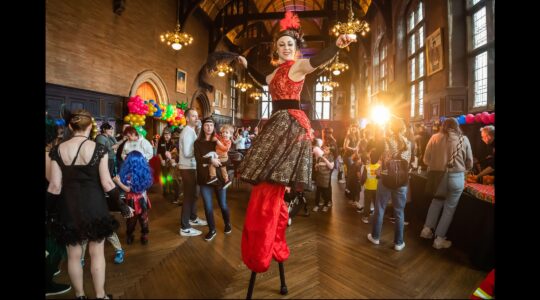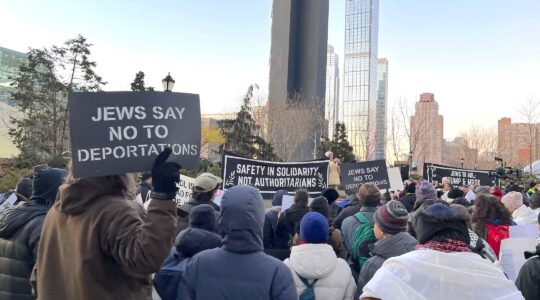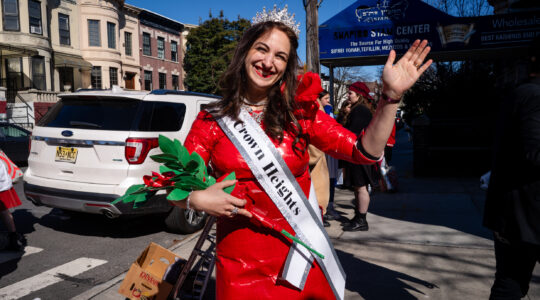In print, the Middle East is a political hotspot of clashing ideologies. The music streaming out of the region, however, reveals that a harmonious cross-cultural interchange is also at work there and in countries to the west along the Mediterranean coast.
Coming from Algeria by way of Europe, the singer Rachid Taha is melding musical elements into a sound that is equal parts rock and rai, Algerian pop music that is itself a blend of Berber, Andalusian and Arabic traditions. Similarly, the music of Hamza El Din, "the father of Nubian music," unites the vocals and drum rhythms of his native Egypt with Arabic classical forms.
Judging from the summer’s offerings at the Lincoln Center Festival, this sort of musical cross-fertilization is happening double time in Israel. Along with Taha and El Din, artists featured in the festival’s four-performance series of North African and Levantine music include Israeli headliners whose music reflects their provenance in the Middle East.
Opening night of the series (titled "Maghreb-Mashreq: East-West Alchemy") features the North American debut of Dikla, whose voice has been compared to that of Umm Kulthoum, the matriarch of Egyptian vocalists. Although she sings in Hebrew and Arabic, Dikla’s vocal style is likely the result of a childhood spent listening to Egyptian radio broadcasts, reportedly the only frequencies she could pick up in her native Beersheva.
That kind of musical exchange and alchemy has been happening throughout the region for centuries, along trade routes and in royal courts. But until the last few decades, Israel’s mainstream music scene was drenched in European tradition or flooded by pop music from England and the United States.
"Now, the artists and musicians creating work and defining Israeli music are coming much more from a Mediterranean and Middle Eastern place than from a European place," says Limor Tomer. A freelance music curator, Tomer developed the program for "Maghreb-Mashreq" (the Arabic names for North Africa and the Middle East, respectively) the latest in her growing portfolio of eclectic projects that encourage experimentation by musicians and audiences.
Israeli composer Yair Dalal, the son of Iraqi immigrants, will lead his international Al Ol Ensemble on July 18. Dalal creates contemporary compositions that draw from what Tomer calls "very traditional Middle Eastern rhythms, modes, scales and instruments," such as the lute-like oud, which he plays.
It’s not so much the integration of immigrants that accounts for the creative reorientation in Israel, Tomer says. "Culturally, Israel is starting to take its place in a more organic, natural sense as part of the Middle East, instead of being this weird European transplant," she suggests.
Tomer is herself a transplant, both in New York City and in the world music scene. Her family, of Moroccan and Eastern European heritage, moved from Tel Aviv’s suburbs to Manhattan’s Upper West Side when Tomer was a teen.
Trained as a classical pianist from the age of 10, she enrolled almost immediately at the Julliard School, where she was consumed with "serious, classical, hardcore" music by "19th-century dead white guys." Tickets to concerts at Lincoln Center were too expensive, so Tomer’s mother bought her a subscription to the Brooklyn Philharmonic at the Brooklyn Academy of Music.
Attending the downtown Brooklyn venue exposed the self-proclaimed "nerdy girl" to the work of adventurous (and alive) composers and performers, such as Philip Glass, Meredith Monk, Pina Bausch and Robert Wilson.
After Tomer saw the new possibilities in music and the performing arts, her career in classical music lost its luster. "I couldn’t remember why I was doing it," she says. She campaigned for nine months to work at BAM, charmed then-president Harvey Lichtenstein, and over the next eight years spearheaded the transformation of the old Carey Playhouse into the BAM Rose Cinemas and the creation of the BAM CafÈ, which hosts 120 free music shows throughout the year.
Tomer still curates the BAM series, including the Sunday afternoon Sounds of Praise Gospel Brunch, but she’s branched out into other projects as well. This year alone, Tomer had her first child (a three-week-old daughter named Amal). And she organized the five-week, 24-night Midsummer Night Swing at Lincoln Center, which this year features local Swing, Latin and African bands in a tribute to the Big Apple. And she’s preparing "Turntable Sessions," a series at the newly opened Bowery Poetry Club that pairs DJs with musicians in a chamber music setting.
Add to that "Maghreb-Mashreq": eight performances in four nights loosely based on four conceptual themes.
For an evening highlighting women’s cultural contributions, Dikla is billed with Souad Massi, an Algerian songwriter whose socially conscious work echoes American folk-and-pop artists Joni Mitchell and Tracy Chapman.
On the second night, Taha makes his debut at Lincoln Center; his previous New York performance was at a dance club downtown. He’s joined in an evening devoted to music of the Maghreb by B’net Marrakech ("Women of Marrakech"), who sing traditional Berber and popular Moroccan songs.
The New York-based, Jerusalem-born composer Raz Mesinai, also known as Badawi (or "the Bedouin"), starts off the concert of instrumental music from the Middle East. His "soundscape" of electronically enhanced compositions will set the mood for performances by El Din and Al Ol.
"Maghreb-Mashreq" culminates July 20 with a one-night-only performance by the Al-Mashreq All-Stars. This group of American and international musicians (playing instruments ranging from turntables to the cornet to a Bedouin stringed instrument called a sumsumiya) have been gathered for the event by the downtown composer Elliot Sharp.
"What was I thinking?" Tomer says of the whirlwind.
One of her intentions certainly was to push Lincoln Center’s regular audience into new musical territory. "To me, it’s all about the audience and the context," she says.
That’s in keeping with the Festival’s mission. Now in its seventh year, the summertime event aims "to expand the definition of performing arts" at the 40-year-old Lincoln Center, says the festival’s managing director Erica Zielinski. Past festivals have featured mini-series on West African, South African, Caribbean, Latin, Asian and gospel music.
"These types of genres are so wide-ranging, any series of four or five concerts can’t be everything to everybody," Zielinski says. Instead, the festival brings together "a critical mass" of musicians "that gets people’s attention."
Even with "Maghreb-Mashreq," Zielinski and Tomer had to limit their coverage, for example, omitting Turkish music. "Basically, we’re hugging the Mediterranean coast" through performances by Moroccan, Algerian, Egyptian, Palestinian, Israeli and Lebanese musicians, Tomer explains.
She says she "couldn’t think about doing this music without representing Israel in the mix." When asked about the seeming preponderance of Israeli performers, Tomer explains that it’s a function of "cultural geography."
"I see it as representative of Israel as part of the Middle East," she says. "In other words, I didn’t see a possibility of doing a festival that went from Morocco to Lebanon and not have Israel in the middle somewhere."
Maghreb-Mashreq runs July 16-20 at LaGuardia Concert Hall. 65th St. at Amsterdam Ave., Man. (212) 875-5928. All performances begin at 8 p.m. and tickets are $25. Souad Massi and Dikla perform July 16; Rachid Taha and B’net Marrakesch on July 17; Hamza El Din, Yair Dalal and Ensemble Al Ol and Raz Mesinai perform July 18; the Al-Mashreq All-Stars led by Elliot Sharp play July 20.
Lincoln Center’s Midsummer Night Swing takes place on the Josie Robertson Plaza every Wed.-Sat. through July 27, 8 p.m., with dance lessons at 6:30 p.m., $12.
BAMcafe is open every Fri. and Sat. through July, 5 p.m.-10:30 p.m. at BAM, 30 Lafayette Ave., Fort Greene, Brooklyn. (718) 636-4139. BAMcafe live performances resume on Oct. 4. Sounds of Praise Gospel Brunch resumes Sept. 29.
The New York Jewish Week brings you the stories behind the headlines, keeping you connected to Jewish life in New York. Help sustain the reporting you trust by donating today.




